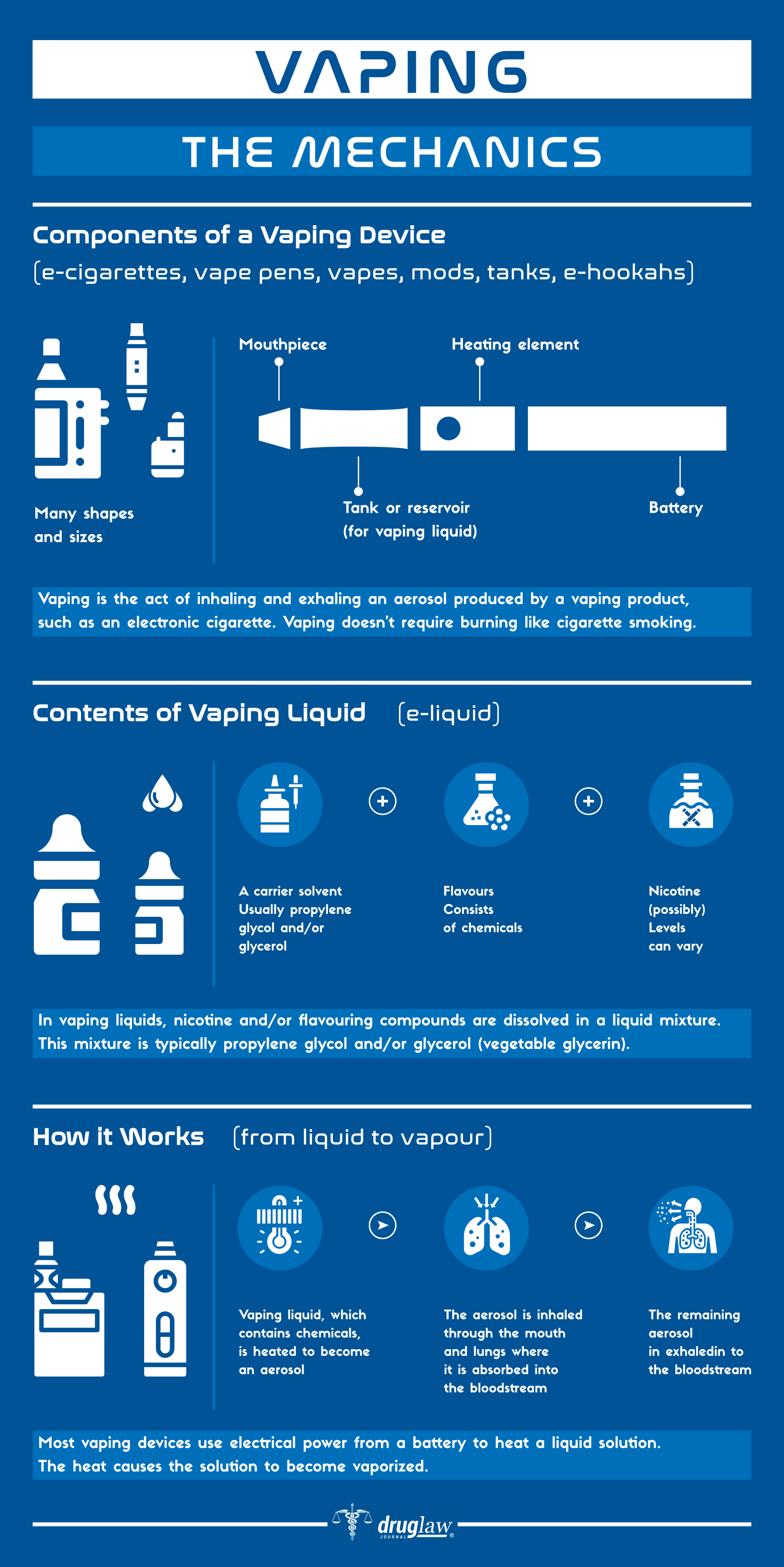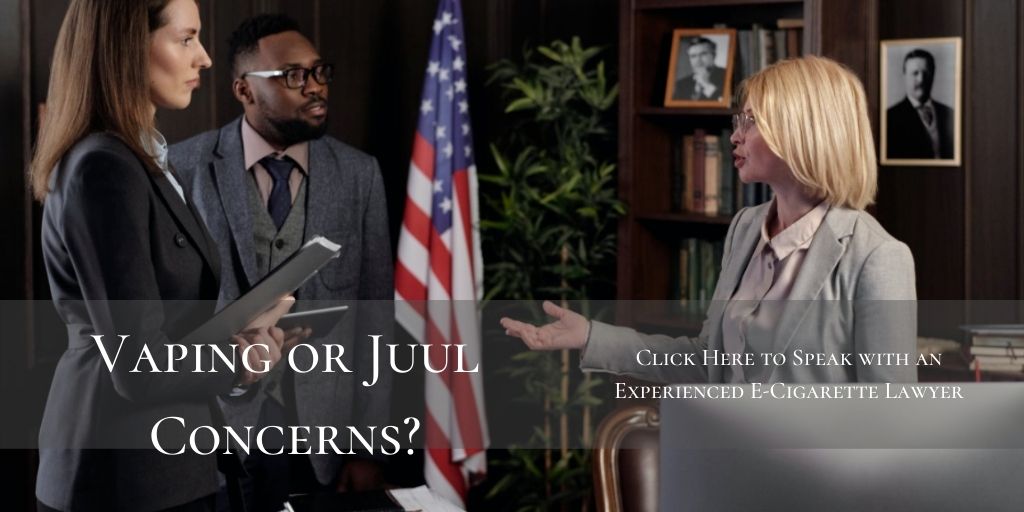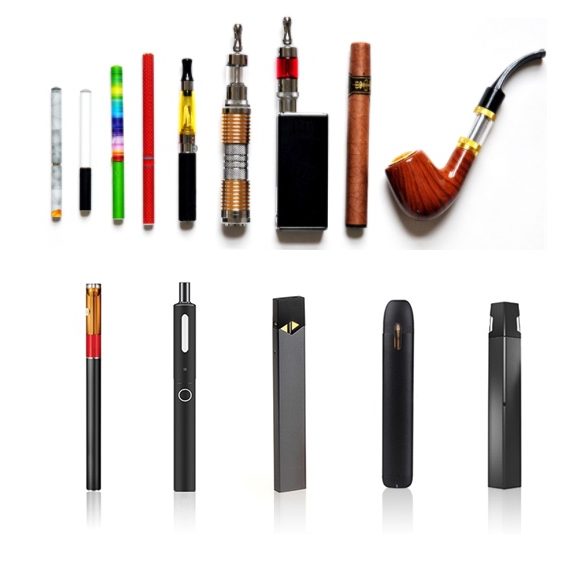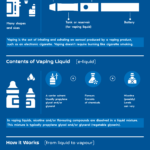Last Updated October 9, 2020
The e-cigarette devices commonly seen around the United States were invented by a Chinese pharmacist, Hon Lik. In 2003, Hon Lik was issued the very first patent for a device using a lithium battery to heat nicotine into a vaporous mist for inhalation. By 2006, e-cigarettes exploded onto the market in the United States and were immediately touted by their manufacturers as either being less dangerous than combustible smoking or as a valuable tool for smoking cessation. E-cigarette use came to be known colloquially as “vaping” or later “juuling” by both the industry and users.

For at least the first decade in the market, manufacturer promotion of vaping products as “safe” or “safer” products went virtually unchallenged. However, with the passage of time, and upon the initiative of scientific experts within the medical community, more and more evidence has begun to emerge which cuts to the very heart of the manufacturer’s safety claims about vaping and e-cigarette products.
In 2018, the first lawsuits against e-cigarette manufacturers started cropping up in federal and state courts throughout the United States. For one of the most popular manufacturers of e-cigarettes, Juul Labs, Inc. (Juul), the lawsuits stemming from its alleged marketing practices have become so numerous that over 650 actions have been consolidated into one multidistrict litigation in federal court in California.
Background and Legal Implications for Vaping
With some exceptions, lawsuits and investigations connected with vaping and the use of e-cigarettes typically allege that e-cigarette manufacturers (in particular, Juul) have:
- Engaged in marketing practices that target young or underage users.
- Used nicotine salts in their products and failed to warn consumers of the chemical’s presence. Nicotine salts are a form of nicotine that differs from the “freebase” form found typically in e-cigarettes and is believed to be far more addictive.
- Improperly labeled the nicotine dosage in their products.
- Improperly marketed their devices as “safer” than combustible smoking.
- Designed a product with an inherent defect that allows excessive nicotine delivery which causes physical harm and addiction.
Alongside these lawsuits, the vaping industry has attracted increased scrutiny from state and federal regulators concerned with the popularity of vaping devices among younger users.
- In 2018, the U.S. Surgeon General declared e-cigarette use “has become an epidemic among our nation’s young people” and in 2016 the U.S. Food and Drug Administration (FDA) finalized a rule giving the Center for Tobacco Products (CTP) regulatory authority over e-cigarettes.
- In 2020, the FDA used that authority to ban the sale of flavored e-cigarette cartridges (except for menthol and tobacco).
- In September 2019, the U.S. Attorney for the Northern District of California announced a criminal investigation of Juul Labs. A few months later, the attorneys general for 39 U.S. states announced their own investigations into the marketing and sales practices of Juul Labs.
Juul Labs and Big Tobacco
Juul is a brand name for a particular type of e-cigarette that is very popular and accounts for about 40% of all e-cigarette sales in the market. Juuls are shaped like USB flash drives and do not resemble traditional, more bulky e-cigarettes. The cartridge packs that come with Juuls frequently contain more nicotine than actual combustible tobacco cigarettes. Juul has become so popular that kids and teens refer to the practice of vaping with a Juul device as “juuling”.
Juul was established in 2015 as “Juul Labs, Inc.” by two entrepreneurs, Adam Bowen and James Monsees who developed the technology themselves. Manufactured in China, Juul grew dramatically in the intervening years and in July 2018, raised $650 million giving the company a valuation of approximately $15 billion. Later, global tobacco producer, Altria, purchased a 35% interest in Juul making the company worth an estimated $38 billion at the end of 2018.
Alleged Breathing Issues Tied to Vaping
E-Cigarette manufacturers have long pushed the notion that their products are either safe or safer than cigarettes. However, users of e-cigarettes and their families have come forward in recent years telling of horrible suffering that they believe is directly attributable to vaping.
- In September 2019, 18-year old Adam Hergenreder was hospitalized and on respiratory support after two years of steady vaping. Mint and mango were his favorite flavors. Doctors have told Adam that his chest X-rays reveal the lungs of a 70-year old man and that they may never truly heal or be the same again.
- The American Thoracic Society (ATS) published an article on the prevalence of Bronchiolitis Obliterans Organizing Pneumonia (BOOP) in patients claiming they use e-cigarettes. BOOP is a rare inflammatory lung disorder involving flu-like symptoms and coughing that make breathing very difficult in sufferers.
- The December 2019 Mayo Clinic Proceedings examined the potential for breathing issues and vaping in its article: “Vaping-related Acute Lung Injury: A New Killer Around the Block.” Among the article’s highlights was the conclusion that the incidence of vaping-related acute lung injury is increasing and that electronic cigarette compounds present the potential for a range of detrimental effects on the human respiratory system.
- The Journal of the Missouri State Medical Association’s November 2019 edition gave an extensive look into the increasingly bleak outlook for Vaping Associated Lung Injury (EVALI) in the United States. The articles noted that as of its publication, there were 2,051 cases of e-cigarette or vaping lung product uses associated with lung injury (with 39 reported deaths) in the U.S. Overwhelmingly, EVALI patients complain of symptoms like cough, chest pain, and shortness of breath. Of the documented cases expressing EVALI, 86% of the patients reported using THC-containing products. In February 2019, the New England Journal of Medicine and the Centers for Disease Control (CDC) had both established research pieces linking Vitamin E Acetate, a thickening fluid used predominantly in THC vaping products with EVALI.
Legal Exposure for Juul and Other E-Cigarette Manufacturers
State Lawsuits Over Targeting of Children
The New York State Attorney General, Letitia James, announced in November 2019 that her office would lead a lawsuit against Juul Labs for “deceptive and misleading” marketing aimed at children. In her announcement, James referenced Juul “launch parties” which involved direct outreach to high schoolers by Juul reps who repeatedly assured students that Juul was safer than cigarettes. The New York lawsuit mirrored similar lawsuits filed earlier in 2019 by California Attorney General Xavier Becerra and Los Angeles District Attorney Jackie Lacey.
Alleged Hemorrhagic Stroke
Maxwell Berger is a 22-year old Syracuse University student that began using Juul in 2015 and quickly developed a two-pod-per-day habit. In 2017, Maxwell suffered a severe hemorrhagic stroke that paralyzed the left side of his body and caused him to lose half of his vision in both eyes. He has suffered from cognitive impairment and brain damage as well. In 2019, Maxwell sued Juul in New York alleging that his use of Juul caused his stroke and injuries.
Contaminated Juul Pods
In October 2019, a former Juul Labs executive, Siddarth Breja, filed a lawsuit in federal court in California that at least one million contaminated Juul pods were let onto the market by the company despite his warnings to the company’s leadership. Among the claims made by Breja in the case was Juul’s CEO Kevin Burns said: “Half our customers are drunk and vaping like mo-fos, who the f**k is going to notice the quality of our pods.”
Breja’s lawsuit did not specify what type of contamination was alleged to manifest in the pods. Furthermore, Juul’s CEO has publicly denied the allegations and claimed that Juul products are tested for toxicity.
Multidistrict Litigation in California
In 2018, two lawsuits were filed in California alleging that Juul was inappropriately marketed as safe even though it contains more nicotine than a traditional cigarette. Thus began a wave of civil lawsuits naming Juul which have now been consolidated into Multi-District Litigation (MDL) before the federal court in the Northern District of California. As of this moment, MDL-2913 has approximately 651 cases pending and is growing.
FDA Investigation Over Possible Juul LInk to Seizures
Bloomberg News obtained communications and memoranda between FDA officials in October 2018 detailing three cases of seizures alongside significant Juul use. While the FDA documentation did not detail any causality between Juul and the seizures, they believe that at a minimum there was an “association” with Juul. Over the next few months, the FDA uncovered an additional 32 reports of e-cigarette use that were believed to be linked to seizures. The FDA announced an investigation into the link between seizures and vaping in April 2019.

Sources Cited (35)
1. “Juul hit with another state lawsuit for allegedly targeting kids” https://www.nbcnews.com/health/vaping/juul-hit-another-state-lawsuit-allegedly-targeting-kids-n1085901
2. “Public health groups fuming over Trump’s inaction on vaping flavor ban” https://www.nbcnews.com/health/vaping/public-health-groups-fuming-over-trump-s-inaction-vaping-flavor-n1084861
3. “Juul Hit With Suit Over Teen’s Death From Respiratory Injury” https://news.bloomberglaw.com/product-liability-and-toxics-law/juul-hit-with-suit-over-teens-death-from-respiratory-injury?context=search&index=0&utm_medium=lawdesk&utm_source=twitter&campaign=8F28EC82-EF85-11E9-AF12-BDEC4F017A06
4. “SU student sues Juul after experiencing ‘catastrophic’ injuries” http://dailyorange.com/2019/09/su-student-sues-juul-experiencing-catastrophic-injuries/
5. “Ex-Juul executive alleges firm sent 1M contaminated pods to market” https://www.axios.com/juul-contaminated-pods-lawsuit-claim-c8c96421-cfd0-43e4-9e45-92fec1d0f6a8.html
6. “Vaping – The Next Wave of Lawsuits” https://www.natlawreview.com/article/vaping-next-wave-lawsuits
7. “‘It’s going to attack your lungs’: Gurnee teen hospitalized for vaping has message for his peers” https://www.chicagotribune.com/lifestyles/ct-life-teen-hospitalized-vaping-tt-20190904-73qpft3x5bc3zkbui7nrve4tsy-story.html
8. “Vapor Lung: Bronchiolitis Obliterans Organizing Pneumonia (BOOP) in Patient with E-Cigarette Use” https://www.atsjournals.org/doi/abs/10.1164/ajrccm-conference.2016.193.1_MeetingAbstracts.A6513
9. “VpALIdVaping-related Acute Lung Injury: A New Killer Around the Block” https://www.mayoclinicproceedings.org/article/S0025-6196(19)30880-8/pdf
10. “Organizing pneumonia related to electronic cigarette use: A case report and review of literature” https://pubmed.ncbi.nlm.nih.gov/29392888/
11. “Possible Juul link to seizures kicks off FDA investigation” https://www.theverge.com/2019/8/29/20838907/juul-seizure-fda-risk-lung-disease-vape-e-cigarette
12. “Factbox: U.S. lawsuits take aim at vaping” https://www.reuters.com/article/us-health-vaping-lawsuit-factbox/factbox-u-s-lawsuits-take-aim-at-vaping-idUSKBN1ZT2CG
13. “The litigation environment in the vape industry” https://www.dlapiper.com/en/us/insights/publications/2020/04/the-litigation-environment-in-the-vape-industry/
14. “Bronchiolitis obliterans organizing pneumonia: Pathogenesis, clinical features, imaging and therapy review” https://www.ncbi.nlm.nih.gov/pmc/articles/PMC2700454/
15. “Vaping Associated Lung Injury (EVALI): An Explosive United States Epidemic” https://www.ncbi.nlm.nih.gov/pmc/articles/PMC6913849/#:~:text=Vaping%20Associated%20Lung%20Injury%20(EVALI)%3A%20An%20Explosive%20United%20States%20Epidemic,-Gary%20A.
16. “Vitamin E Acetate in Bronchoalveolar-Lavage Fluid Associated with EVALI” https://www.nejm.org/doi/full/10.1056/NEJMoa1916433
17. “Juul Shipped At Least A Million Contaminated Pods, New Lawsuit Says” https://www.buzzfeednews.com/article/stephaniemlee/juul-lawsuit-contaminated-pods
18. “What We Know About Electronic Cigarettes” https://smokefree.gov/quit-smoking/ecigs-menthol-dip/ecigs#:~:text=E%2Dcigarettes%20are%20battery%2Dpowered,%2C%20flavorings%2C%20and%20other%20chemicals.
19. “NIH Drug Facts: Vaping Devices” https://www.drugabuse.gov/publications/drugfacts/vaping-devices-electronic-cigarettes
20. “How Electronic Cigarettes Work” https://science.howstuffworks.com/innovation/everyday-innovations/electronic-cigarette.htm
21. “The Three Main Reasons Youth Use E-Cigarettes” https://truthinitiative.org/research-resources/emerging-tobacco-products/3-main-reasons-youth-use-e-cigarettes
22. “FDA finalizes enforcement policy on unauthorized flavored cartridge-based e-cigarettes that appeal to children, including fruit and mint” https://www.fda.gov/news-events/press-announcements/fda-finalizes-enforcement-policy-unauthorized-flavored-cartridge-based-e-cigarettes-appeal-children
23. “E-cigarette Ads and Youth” https://www.cdc.gov/vitalsigns/ecigarette-ads/index.html
24. “A closer look at vaping and e-cigarettes on college campuses” https://www.wildcat.arizona.edu/article/2019/11/n-vaping-health
25. “Did the FDA Ban E-Cig Flavors? Here’s What to Know” https://www.healthline.com/health-news/e-cig-flavor-ban-what-to-know
26. “Enforcement Priorities for Electronic Nicotine Delivery System (ENDS) and Other Deemed Products on the Market Without Premarket Authorization” https://www.fda.gov/regulatory-information/search-fda-guidance-documents/enforcement-priorities-electronic-nicotine-delivery-system-ends-and-other-deemed-products-market
27. “Are Vaping and Juuling the Same Thing?” https://www.therecoveryvillage.com/teen-addiction/faq/are-vaping-and-juuling-the-same/
28. “Juul is under criminal investigation by federal prosecutors” https://www.theverge.com/2019/9/23/20880625/juul-criminal-investigation-ftc-fda-federal-probe
29. “E-Cigarettes: Current Evidence and Policy” https://www.ncbi.nlm.nih.gov/pmc/articles/PMC6140188/
30. “Xu X, Bishop EE, Kennedy, et al. Annual Healthcare Spending Attributable to Cigarette Smoking. American Journal of Preventive Medicine. 2015;48(3):326–333” https://www.sciencedirect.com/science/article/abs/pii/S0749379714006163
31. “Electronic Cigarettes: A Policy Statement From the American Heart Association. Circulation.” https://www.ahajournals.org/doi/full/10.1161/CIR.0000000000000107
32. “E-cigarettes: How “safe” are they? The Journal of Family Practice” https://www.mdedge.com/clinicianreviews/article/109243/addiction-medicine/e-cigarettes-how-safe-are-they
33. “Four hundred and sixty brands of e-cigarettes and counting: implications for product regulation.” https://tobaccocontrol.bmj.com/content/23/suppl_3/iii3.short
34.“Progression of Poly-tobacco Product Use Patterns in Adolescents” https://www.sciencedirect.com/science/article/abs/pii/S0749379716300964
35. “U.S. Department of Health and Human Services . A Report of the Surgeon General. Atlanta, GA: U.S. Department of Health and Human Services, Centers for Disease Control and Prevention, National Center for Chronic Disease Prevention and Health Promotion, Office on Smoking and Health; 2016. E-Cigarette Use Among Youth and Young Adults.” https://books.google.com/books?hl=en&lr=&id=Oy95lDRWJPUC&oi=fnd&pg=PA1&ots=tIjXD2x-EO&sig=U3wfXsGKmGqL1zBCWxTY-5oOOtQ#v=onepage&q&f=false



